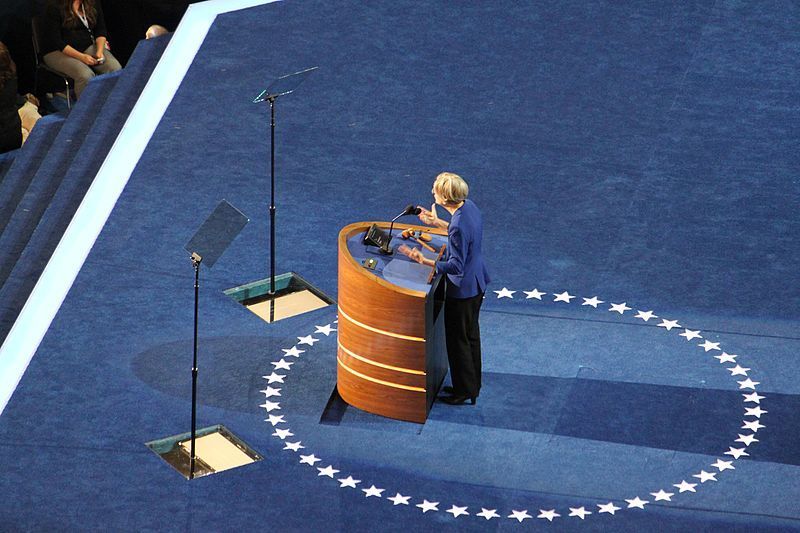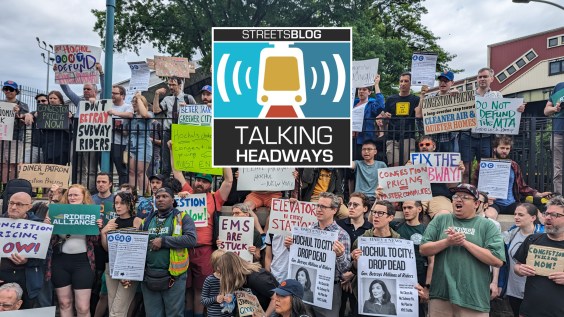The Democratic presidential candidates are racing to release their climate proposals ahead of Wednesday night's primary debate. But we've yet to see a candidate come forward with a really compelling vision for addressing America's unhealthy relationship with cars.
Senator Elizabeth Warren today unveiled her climate plan, borrowed largely from that of Washington Governor Jay Inslee. But even Warren (known for her wonkiness) and Inslee (for his climate zeal) stopped short of reimagining how our cities and suburbs could function in a way that gives residents alternatives to driving for every trip.
Warren's plan, like that of Senator Bernie Sanders, which was released last month, focuses a great deal on converting the vehicle fleet to run on electricity. Swapping out gas tanks for batteries will be an important part of lessening carbon emissions from American transportation, and will be expensive. Warren says she wants to make all new vehicles electric by 2030 — and the electric grid 100 percent renewable by 2035.
But Warren's Medium post outlining the plan doesn't mention walking or biking — and she only briefly mentions wanting to "expand and improve public transit across our country."
What's missing?
The gaps and omissions are worrying.
Even when the Democrats' plans devote paragraphs on making American infrastructure more climate resilient, they don't mention sidewalks — or the appalling lack thereof. They don't mention bus shelters, or the squalid conditions in which bus riders are forced to wait in America. These are key ways that American infrastructure is not up to the challenges of our era.
Jay Inslee's "Freedom from Fossil Fuels" plan, for example, makes zero references to: buses, cities, transit, land use or trains (except to use the phrase "gravy train.") Bernie Sanders' plan, while being extremely ambitious in a lot of ways, even proposed billions in spending that could be used to widen highways.
Some activists have become frustrated, referring it to "the liberal blind spot for cars."
Sadly it is missing transportation policy. Getting everyone electric cars is not helpful when people will be shackled to them more every year. We need policy that shortens and shares trips. That is not only good for the environment, but for the economy and is more equitable. https://t.co/5Q0vZBeb2j
— Beth Osborne (@BethOsborneTA) September 4, 2019
To be fair, Inslee's climate plans (he has six, totaling 218 pages) go into more detail about reducing car use. His "Evergreen Economy for America" plan calls for doubling public-transit spending. It also calls for providing local, state and tribal governments with "much-needed resources to invest in expanding public transit and connecting people in communities through safe, multi-modal transportation options" and for expanding federal incentives for affordable, transit-oriented development and regional land-use planning.
The plan says this "includes local transportation plans that promote biking, walking and micro-mobility, such as electric scooters and e-bikes."
So at least biking and walking get a good solid paragraph that says the right things.
Reducing car use
Kamala Harris, meanwhile, deserves credit for explicitly pointing out that we need to reduce car use — something the other candidates sidestep.
Harris's plan says:
"We must also incentivize people to reduce car usage and use public transit. This starts by funding robust public transportation networks to bring communities together and focusing our transportation infrastructure investments toward projects that reduce vehicle miles traveled and address gaps in first mile, last mile service."
The Intergovernmental Panel on Climate Change says Americans must reduce their driving trips by about 20 percent and electrify the fleet in order avoid the worst effects of climate change.
But Harris's outline doesn't emphasize ways of reducing driving — for example, zoning changes — to the same extent it does other goals, such as creating and preserving jobs or constructing green buildings.
Perhaps the subject will come up during the debate — but, more likely, it won't.
That's a shame, because a large federal spending program like these Democratic proposals provide an excellent opportunity to rethink the systems that have helped make transportation the country's largest source of greenhouse-gas emissions. Investment in amenities such as better sidewalks, more bus-service hours, and thoughtful rezonings, could not only help save the planet — it also could promote public health and make our country more equal.






